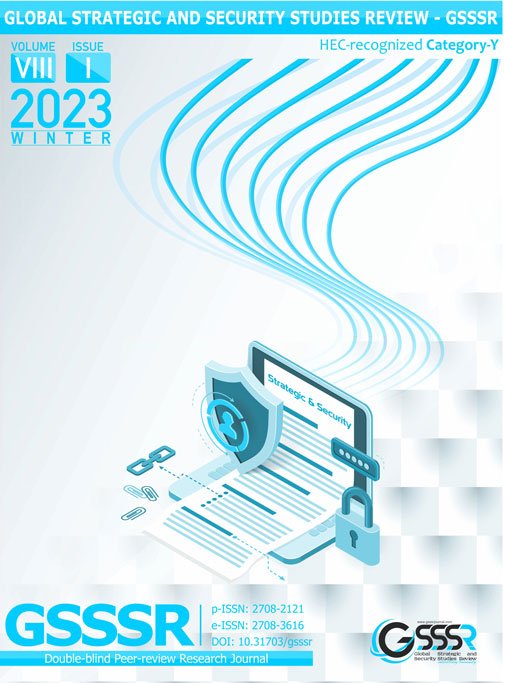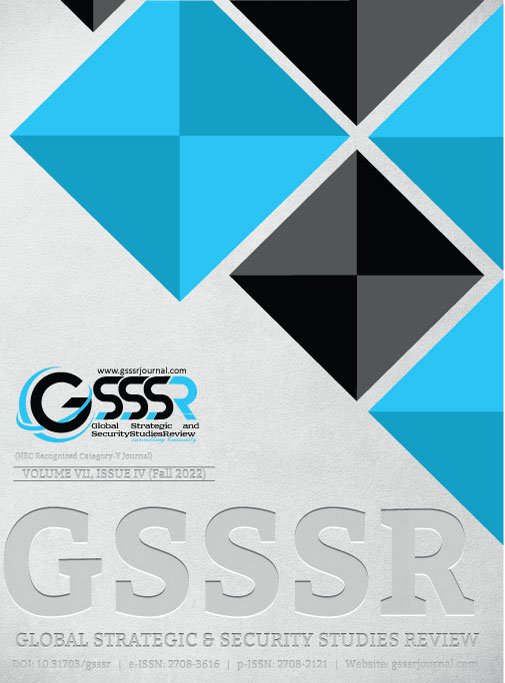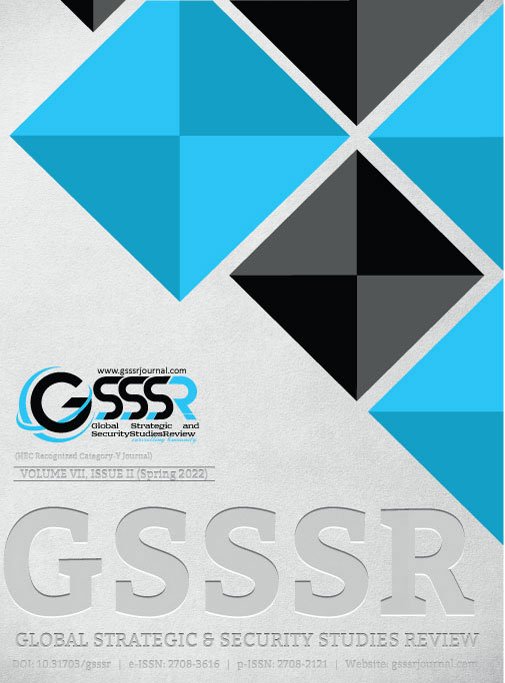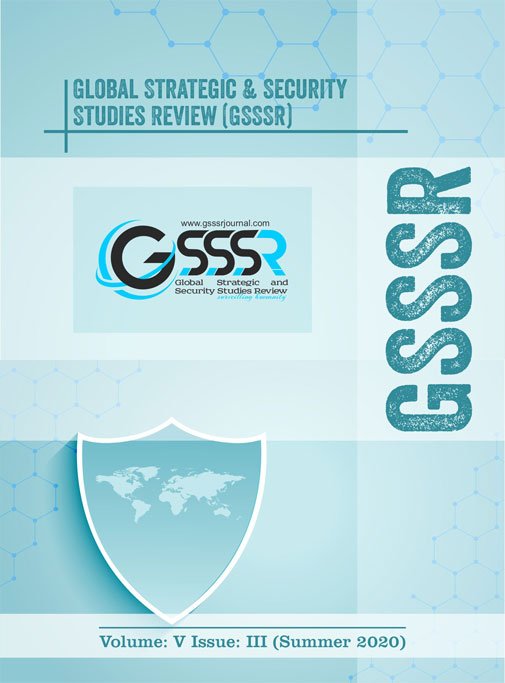01 - Climate Change As A Non-Traditional Security Threat: Its Implications For Pakist
http://dx.doi.org/10.31703/gsssr.2022(VII-III).0110.31703/gsssr.2022(VII-III).01 Published : Sep 2022
-
The biggest challenge of the 21st century is climate change. It is predicted to increase human vulnerability and the frequency and intensity of non-traditional insecurities. Due to its diverse terrain and tropical and continental climates, Pakistan is subject to several climatic and weather-related natural disasters (cold winters and hot summers). It is usual to experience extreme weather, drought... Details
-
Climate Change, Non-traditional Security, Pakistan
-
(1) Abdul waheed
Ph.D. Scholar, Department of Pakistan Studies, Abbottabad University of Science and Technology, KP, Pakistan.
(2) Muhammad Rizwan
Associate Professor, Department of Pakistan Studies, Abbottabad University of Science and Technology, KP, Pakistan.
(3) Muhammad Umar
Assistant Professor, Department of History and Politics, University of Haripur, KP, Pakistan.
02 - Comprehensive National Defense: Applications for National Defense of Pakistan
http://dx.doi.org/10.31703/gsssr.2022(VII-III).0210.31703/gsssr.2022(VII-III).02 Published : Sep 2022
-
Pakistan is a state besieged by many internal and external threats. This paper analyses the relationship between wide-ranging social, structural and economic threats as well as institutional and structural issues that exist within the country's institutional frameworks and seeks to propose adoption a 'Comprehensive National Defense' approach which seeks to integrate the entire military and civilia... Details
-
Comprehensive National Defense, Pakistan, Threats
-
(1) Muhammad Rehan Zafar
Lecturer, Department of International Relations, National University of Modern Languages, Rawalpindi, Punjab, Pakistan.
(2) Muhammad Yasin Sultan Raja
Lecturer, Department of International Relations, National University of Modern Languages, Rawalpindi, Punjab, Pakistan.
(3) Ayesha Rana
Assistant Professor, Department of International Relations, National University of Modern Languages, Rawalpindi, Punjab, Pakistan.
03 - The Politics of Troika: A Case Study of Governance in Pakistan (1947-1969)
http://dx.doi.org/10.31703/gsssr.2022(VII-III).0310.31703/gsssr.2022(VII-III).03 Published : Sep 2022
-
Federalism with optimum provincial autonomy was the core idea behind the creation of Pakistan. As a symbol of shared sovereignty, federalism was never exercised in Pakistan in its real spirit. Despite apparent federal features during the military as well as democratic regimes, the political culture within the country scraps the dictatorial and centripetal. Pakistan remains unsuccessful to remains ... Details
-
Troika Politics, Governance, Implications, Bureaucracy, Military, Civilian
-
(1) Javed Ali Kalhoro
Assistant Professor, Department of Pakistan Studies, National University Of Modern Languages, Islamabad, Pakistan.
(2) Azhar Mahmood Abbasi
Lecturer, Department of Pakistan Studies, National University Of Modern Languages, Islamabad, Pakistan.
(3) Munazza Mubarak
Lecturer, Department of Pakistan Studies, National University Of Modern Languages, Islamabad, Pakistan.
04 - Transformation in the Islamic Identity of Middle East: Motives, Drivers and Impa
http://dx.doi.org/10.31703/gsssr.2022(VII-III).0410.31703/gsssr.2022(VII-III).04 Published : Sep 2022
-
Ever since the advent of Islam in 7th Century AD, the Middle East maintained its Islamic identity. There have been numerous attempts to alter the Islamic identity of the region in the past. Nevertheless, people resisted the change and their belief system somehow remained unmoved. Owing to its geographical proximity, geopolitical and geo-economic interests, West is considered to be the key driver ... Details
-
Transformation, Islam, Muslims, Middle East, Identity, Secularism, Power Play, Major Powers, West, US, Vested Powers, Indo-Israel, etc
-
(1) Muhammad Khan
Professor/ Chairman, Department of Politics and International Relations, International Islamic University, Islamabad, Pakistan.
05 - A Challenge to Unipolar Hegemony: Understanding the contours Sino-Russian Milita
http://dx.doi.org/10.31703/gsssr.2022(VII-III).0510.31703/gsssr.2022(VII-III).05 Published : Sep 2022
-
Sino-Russian military cooperation has a long history stemming from their shared ideological leanings during the twentieth century. However, this military cooperation has evolved greatly, especially during the last two decades during which this multifaceted cooperation has emerged as a balancing force to US unipolar hegemony since the end of the cold War. This paper seeks to understand the hi... Details
-
Sino-Russia, Military Cooperation, International Relations
-
(1) Muhammad Yasin Sultan Raja
Lecturer, Department of International Relations, NUML, Rawalpindi, Punjab, Pakistan.
(2) Muhammad Rehan Zafar
Lecturer, Department of International Relations, NUML, Rawalpindi, Punjab, Pakistan.
(3) Beenish Khan
Lecturer, Department of International Relations, NUML, Rawalpindi, Punjab, Pakistan.

 Volume X, Issue I (Winter 2025)
Volume X, Issue I (Winter 2025)  Volume IX, Issue III (Summer 2024)
Volume IX, Issue III (Summer 2024)  Volume IX, Issue II (Spring 2024)
Volume IX, Issue II (Spring 2024)  Volume IX, Issue I (Winter 2024)
Volume IX, Issue I (Winter 2024)  Volume VIII, Issue IV (Fall 2023)
Volume VIII, Issue IV (Fall 2023)  Volume VIII, Issue III (Summer 2023)
Volume VIII, Issue III (Summer 2023)  Volume VIII, Issue II (Spring 2023)
Volume VIII, Issue II (Spring 2023)  Volume VIII, Issue I (Winter 2023)
Volume VIII, Issue I (Winter 2023)  Volume VII, Issue IV (Fall 2022)
Volume VII, Issue IV (Fall 2022)  Volume VII, Issue III (Summer 2022)
Volume VII, Issue III (Summer 2022)  Volume VII, Issue II (Spring 2022)
Volume VII, Issue II (Spring 2022)  Volume VII, Issue I (Winter 2022)
Volume VII, Issue I (Winter 2022)  Volume VI, Issue IV (Fall 2021)
Volume VI, Issue IV (Fall 2021)  Volume VI, Issue III (Summer 2021)
Volume VI, Issue III (Summer 2021)  Volume VI, Issue II (Spring 2021)
Volume VI, Issue II (Spring 2021)  Volume VI, Issue I (Winter 2021)
Volume VI, Issue I (Winter 2021)  Volume V, Issue IV (Fall 2020)
Volume V, Issue IV (Fall 2020)  Volume V, Issue III (Summer 2020)
Volume V, Issue III (Summer 2020)  Volume V, Issue II (Spring 2020)
Volume V, Issue II (Spring 2020)  Volume V, Issue I (Winter 2020)
Volume V, Issue I (Winter 2020)  Volume IV, Issue I (Fall 2019)
Volume IV, Issue I (Fall 2019)  Volume III, Issue I (Fall 2018)
Volume III, Issue I (Fall 2018)  Volume II, Issue I (Fall 2017)
Volume II, Issue I (Fall 2017)  Volume I, Issue I (Fall 2016)
Volume I, Issue I (Fall 2016)